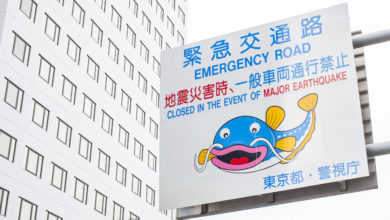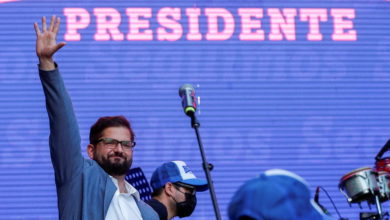People Flee East Ukraine After Deadly Train Station Strike

KYIV, Ukraine — Civilian evacuations moved forward in patches of battle-scarred eastern Ukraine on Saturday, a day after a missile strike killed at least 52 people and wounded more than 100 at a train station where thousands clamored to leave before an expected Russian onslaught.
In the wake of the attack in Kramatorsk, several European leaders made efforts to show solidarity with Ukraine, with the Austrian chancellor and British prime minister visiting Kyiv — the capital city that Russia failed to capture and where troops retreated days ago. U.K. Prime Minister Boris Johnson met with Ukrainian President Volodymyr Zelenskyy, where Johnson’s office said they discussed Britan’s “long-term support.”
Ukrainian authorities are urging civilians to evacuate in advance of a Russian-led offensive on the east. Fearing that the Russian invasion would continue, people rushed to get out of Kramatorsk by Saturday’s trains.
“It was terrifying. The horror, the horror,” one resident told British broadcaster Sky, recalling Friday’s attack. “Heaven forbid, to live through this again. No, I don’t want to.”
Ukraine’s state railway company said in a statement that residents of Kramatorsk and other parts of the country’s contested Donbas region could flee through other train stations. Iryna Vereshchuk, Deputy Prime Minister, said that 10 evacuation routes were being planned for Saturday.
Six weeks ago, Russia invaded Ukraine. It has since pulled troops out of Ukraine’s northern region, including around Kyiv. Then, the Russian military refocused its attention on Ukraine’s Donbas area in the east. Western military analysts said an arc of territory in eastern Ukraine was under Russian control, from Kharkiv — Ukraine’s second-largest city — in the north to Kherson in the south. According to Western assessment, Russian counterattacks threaten Kherson and Ukrainian forces repel Russian attacks elsewhere in the Donbas area in the southeast.
Zelenskyy considered the attack at the train station a recent example of war crimes perpetrated by Russian forces. He said it should inspire the West and encourage his country to defend itself.
“All world efforts will be directed to establish every minute of who did what, who gave what orders, where the missile came from, who transported it, who gave the command and how this strike was agreed,” Zelenskyy said in his nightly video address, his voice rising in anger.
Russia denied it was responsible and accused Ukraine’s military of firing on the station to turn blame for civilian casualties on Moscow. A Russian Defense Ministry spokesman detailed the missile’s trajectory and Ukrainian troop positions to bolster the argument.
Experts from the West and Ukrainian officials insisted on Russia’s launch of this weapon. Remnants of the rocket had the words “For the children” in Russian painted on it. This phrasing suggested that the missile had been sent to revenge the death or subjugation children. However, its precise meaning is still unclear.
Western experts dismissed Kremlin spokesperson Dmitry Peskov’s assertion that Russian forces “do not use” Tochka-U missiles, the type that hit the Kramatorsk train station, which is in Ukrainian government-controlled territory in the Donbas.
As Ukrainian authorities tried to find victims and record possible war crimes committed by Russian soldiers in the north of Ukraine, they were attacked. Bucha’s mayor, who was near Kyiv, stated that graphic evidence showed civilian deaths after Russian troops withdrew. He said that search teams are still looking for bodies from people killed in close quarters, including those shot in parks, yards and squares.
On Friday, workers unearthed the bodies of 67 people from a mass grave near a church, according to Ukraine’s prosecutor general. Russia falsely claims that scenes in Bucha were staged.
Ukrainian authorities and Western officials have repeatedly accused Russian forces of committing atrocities in the war that began with Russia’s Feb. 24 invasion. A total of 176 children have been killed, while 324 more have been wounded, the country’s Prosecutor General’s Office said Saturday.
In an excerpted interview with American broadcaster CBS’ “60 Minutes” that aired Friday, Zelenskyy cited communications intercepted by the Ukrainian security service as evidence of Russian war crimes. It was impossible to independently verify the authenticity of these recordings.
“There are (Russian) soldiers talking with their parents about what they stole and who they abducted. There are recordings of (Russian) prisoners of war who admitted to killing people,” he said. “There are pilots in prison who had maps with civilian targets to bomb. There are also investigations being conducted based on the remains of the dead.”
Ukrainian authorities warned that more mass killings are possible once they reach Mariupol (a southern port city in the Donbas), which has already been under intense fighting and a prolonged blockade.
The city was flooded with journalists returning from abroad, and new photos emerged showing the devastation caused by the airstrike that struck a theater in October. It is believed hundreds were killed as they sought shelter.
Although military analysts predicted that Russia would take Mariupol for several weeks, they said the Ukrainian defense forces were fighting a losing battle. The city’s location on the Sea of Azov is critical to establishing a land bridge from the Crimean Peninula, which Russia seized from Ukraine eight years ago.
Most civilians trying to flee are used to being in or close to a conflict zone. Since 2014, Russian-backed rebels have been fighting Ukrainian forces in Donbas.
Russian President Vladimir Putin acknowledged the independance of Ukraine’s separatists the same week and stated that he would send troops to help protect the residents of this mostly Russian-speaking industrial area.
Ukrainian officials have repeatedly pleaded for more arms and sanctions against Russia, which include the removal of Russian banks out the global financial system, as well as an EU-wide embargo on Russian gasoline and oil.
Western leaders were outraged by the killing of innocent civilians at the train station, and they promised that Russia would be subject to further sanctions for its conduct in Ukraine. On Saturday, Russia’s Defense Ministry tried to counter the dominant international narrative by again raising the specter of Ukraine planting false flags and misinformation.
A ministry spokesman, Major Gen. Igor Konashenkov, alleged Ukraine’s security services were preparing a “cynical staged” media operation in Irpin, another town near Kyiv. Konashenkov said the plan was to show — falsely, he said — more civilian casualties at the hands of the Russians and to stage the slaying of a fake Russian intelligence team that intended to kill witnesses. These claims cannot be independently confirmed.
Austrian Chancellor Karl Nehammer said during a visit to Kyiv on Saturday that he expects more EU sanctions against Russia, but he defended his country’s opposition so far to cutting off deliveries of Russian gas.
A package of sanctions imposed this week “won’t be the last one,” the chancellor said, acknowledging that “as long as people are dying, every sanction is still insufficient.” Austria is militarily neutral and not a member of NATO.
Johnson’s visit, which was not announced in advance, came a day after the U.K. pledged an additional 100 million pounds ($130 million) in high grade military equipment to Ukraine.
___
Anna covered the story from Bucha in Ukraine. Reporting from Bucha, Ukraine was done by Robert Burns and Jill Lawless in Washington. Danica Kirka in London contributed as well as Associated Press journalists all over the globe.
___
Follow the AP’s coverage of the war at https://apnews.com/hub/russia-ukraine
Read More From Time




